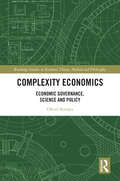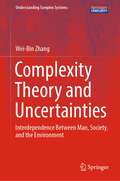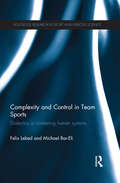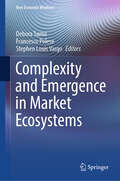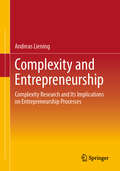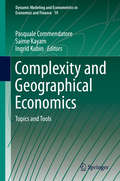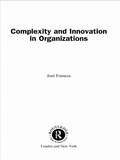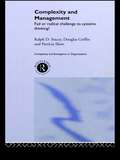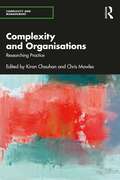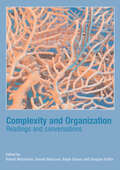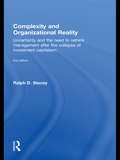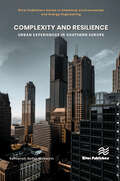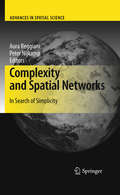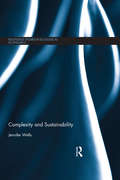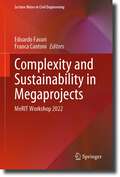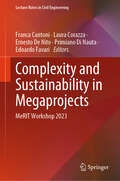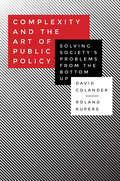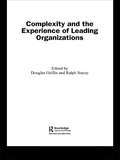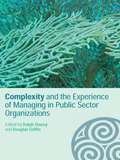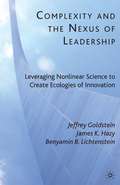- Table View
- List View
Complexity Economics: Economic Governance, Science and Policy (Routledge Studies in Economic Theory, Method and Philosophy)
by Olivér KovácsOur socio-economic innovation ecosystem is riddled with ever-increasing complexity, as we are faced with more frequent and intense shocks, such as COVID-19. Unfortunately, addressing complexity requires a different kind of economic governance. There is increasing pressure on economics to not only going beyond its traditional mainstream boundaries but also to tackle real-world problems such as fostering structural change, enhancing sustained growth, promoting inclusive development in the era of the digital economy, and boosting green growth, while addressing the divide between the financial sector and the real economy. This book demonstrates how to apply complexity science to economics, in an effective and instructive way, in the interest of life-enhancing policies. The book revolves around the non-negligible problem of why economics, to date, seems to be insufficient in guiding economic governance to navigate through real and ever-intensifying complex socio-economic and environmental challenges. With its interdisciplinary approach, the book scans the nuanced nexus between complexity and economics by incorporating, as well as transcending the state-of-the-art literature. It identifies ways to trigger opportunities for behaviour change in the economic profession with respect to how to teach and what, introducing and developing further complexity economics thinking with the configuration of its main principles and outlining the silhouette of next-generation economic governance. The book deciphers recommendations both for economic theory, practice, and education and economic governance. It will be of interest to students, scholars, academics, think tank researchers and economic policy practitioners at the national and/or supranational level.
Complexity Theory and Uncertainties: Interdependence Between Man, Society, and the Environment (Understanding Complex Systems)
by Wei-Bin ZhangThis book provides an overview of recent developments of complexity theory within the realm of social sciences. At a time when global and local social, political, cultural, and economic affairs are engulfed in chaos, this book sheds light on the mechanisms of uncertainties, offering new visions and frameworks for analyzing the nonlinear interactions between individuals, societies, and the environment.From exploring the foundational elements that shape our understanding of humanity, such as worldviews, justice, and trust, to applying complexity theory in the realms of politics, economics, management, strategies, and wars, this monograph provides a comprehensive examination of its far-reaching implications. By examining historical bifurcations and structural changes in American history and China's modern development, it emphasizes how complexity theory can serve as a bridge for intellectual and cultural communication between Western (Newtonian) and East Asian (yin-yang-based) civilizations.Moreover, the book elucidates that nonlinear phenomena, including bifurcations, catastrophes, structural changes, emergence of structures, and chaos, are integral aspects of human evolution. It unveils the positive potential within chaos, demonstrating that a comprehensive understanding of catastrophic mechanisms enables humanity to prevent global disasters by leading systems to chaotic attractors without destructive consequences. Through an exploration of the intricate interdependencies among individuals, societies, and the environment, this book offers a unique and comprehensive introduction to the application of complexity theory to the realm of humanity.
Complexity and Control in Team Sports: Dialectics in contesting human systems (Routledge Research in Sport and Exercise Science)
by Michael Bar-Eli Felix LebedComplexity and Control in Team Sports is the first book to apply complex systems theory to ‘soccer-like’ team games (including basketball, handball and hockey) and to present a framework for understanding and managing the elite sports team as a multi-level complex system. Conventional organizational studies have tended to define team sports as a set of highly heterogeneous physical, mental and cognitive activities within which it is difficult, if not impossible, to find common behavioural playing regularities or universal pedagogies for controlling those activities. Adopting a whole system approach, and exploring the concepts of control, regulation and self-organization, this book argues that it is possible for coaches, managers and psychologists to develop a better understanding of how a complex system works, and therefore, to more successfully manage and influence a team’s performance. This book draws on literature from the biological, behavioural and social sciences, including, psychology, sociology and sports performance analysis, to develop a detailed, interdisciplinary and multi-level picture of the elite sports team. It analyzes behaviour across five inter-connected levels: the team as a ‘managed institution’; coaching staff controlling players via cybernetic flows; the team as a playing unit; the individual player as a complex dynamic system expressed through behaviour; and a player’s complex physiological/biological system. Drawing these together, the book throws fascinating new light on the elite sports team and will be useful reading for all students, researchers or professionals with an interest in sport psychology, sport management, sport coaching, sport performance analysis or complex systems theory.
Complexity and Emergence in Market Ecosystems (New Economic Windows)
by Francesco Polese Debora Sarno Stephen Louis VargoThis book delves into the intricacies of transformative processes, focusing particularly on radical and disruptive changes that shape markets, social systems, organizations, cities, and service ecosystems. In a world characterized by turbulence, unpredictability, and complex challenges, managers and marketers are tasked with navigating change and driving progress. Drawing on frameworks, typologies, and insights from diverse theories—including complexity theory, emergence theory, and service-dominant logic—this book equips academics and practitioners with the tools to analyze, understand, and facilitate the transformation of their systems. Rooted in research and discussions from international academic events such as the Naples Forum on Service and the Forum of Markets and Marketing, this book offers invaluable guidance for those seeking to design sustainable transformations in today's dynamic landscape.
Complexity and Entrepreneurship: Complexity Research and Its Implications on Entrepreneurship Processes
by Andreas LieningStarting from the question of what systematic peculiarities in the behavior of leaders and entrepreneurs need to be considered, this book provides a new theoretical perspective for entrepreneurial analysis, evaluation, decision-making, and action. Various theories of complex systems, such as the theory of self-organization (synergetics), are presented. Additionally, methodological approaches for the empirical examination of complexity and the resulting consequences in the field of entrepreneurship are discussed. Overall, it suggests that old models like the Laplacean worldview or Kant's question of what we can know need to be reconsidered. This book offers surprising answers, particularly revealing new opportunities and possibilities in complex processes like starting a business.The second expanded and updated edition strengthens the focus on entrepreneurship as the book's main theme. It includes new and current examples from the real economy, as well as additional empirical data supporting the model analysis.The second expanded and updated edition strengthens the focus on entrepreneurship as the book's main theme. It includes new and current examples from the real economy, as well as additional empirical data supporting the model analysis.The second expanded and updated edition strengthens the focus on entrepreneurship as the book's main theme. It includes new and current examples from the real economy, as well as additional empirical data supporting the model analysis.The second expanded and updated edition strengthens the focus on entrepreneurship as the book's main theme. It includes new and current examples from the real economy, as well as additional empirical data supporting the model analysis.The second expanded and updated edition strengthens the focus on entrepreneurship as the book's main theme. It includes new and current examples from the real economy, as well asadditional empirical data supporting the model analysis.The second expanded and updated edition strengthens the focus on entrepreneurship as the book's main theme. It includes new and current examples from the real economy, as well as additional empirical data supporting the model analysis.The second expanded and updated edition strengthens the focus on entrepreneurship as the book's main theme. It includes new and current examples from the real economy, as well as additional empirical data supporting the model analysis.The second expanded and updated edition strengthens the focus on entrepreneurship as the book's main theme. It includes new and current examples from the real economy, as well as additional empirical data supporting the model analysis.
Complexity and Geographical Economics: Topics and Tools (Dynamic Modeling and Econometrics in Economics and Finance #19)
by Pasquale Commendatore Saime Kayam Ingrid KubinThe uneven geographical distribution of economic activities is a huge challenge worldwide and also for the European Union. In Krugman's New Economic Geography economic systems have a simple spatial structure. This book shows that more sophisticated models should visualise the EU as an evolving trade network with a specific topology and different aggregation levels. At the highest level, economic geography models give a bird eye's view of spatial dynamics. At a medium level, institutions shape the economy and the structure of (financial and labour) markets. At the lowest level, individual decisions interact with the economic, social and institutional environment; the focus is on firms' decision on location and innovation. Such multilevel models exhibit complex dynamic patterns - path dependence, cumulative causation, hysteresis - on a network structure; and specific analytic tools are necessary for studying strategic interaction, heterogeneity and nonlinearities.
Complexity and Innovation in Organizations
by Jose FonsecaTaking a critical look at major perspectives on innovation, this book suggests that innovation is not a designed functional activity of a firm or an intentional process through which firms anticipate changes in conditions. Jose Fonseca proposes that the concepts behind the innovation experiences cannot be traced to any particular time, space
Complexity and Leadership (Complexity and Management)
by Emma Crewe Chris Mowles Kiran ChauhanLeading organisations in our contemporary world means grappling with unpredictability, painful pressures and continual conflict, all in the context of an acceleration in the pace of change. We expect the impossible from heroic leaders and they rarely live up to expectations. With countless recommendations, self-help books and new concepts, scholars and management consultants often simplify and dream unrealistically. This book challenges the more orthodox discourse on leadership and presents a way of thinking about leadership that pays closer attention to experience. The contributors in this book, all senior managers or facilitators of leadership development, resist easy solutions, new typologies or unrealistic prescriptions. Writing about their experiences in Denmark, the UK, Israel, Ethiopia, South Africa and beyond, they are less concerned with traits that people can possess and learn, or magical promises of recipes for success, and more with the socio-political process of the interaction between people from which leadership emerges as a theme. We focus on understanding leadership as a practice within which communication, research, imagination and ethical judgements are continuously improvised. So rather than idealising leadership, or reducing it to soothing tools and techniques, we suggest how leaders might become more politically, emotionally and socially savvy. This book is written for academics and practitioners with an interest in the everyday challenges of both individual and group practices of formal and informal leaders in different types of organisations, and is an ideal resource for executives and students on leadership development programmes. We hope this volume will help readers to expand the wisdom found in their own experience and discover for themselves and for others, a greater sense of freedom.
Complexity and Leadership (Complexity and Management)
by Emma Crewe Chris Mowles Kiran ChauhanLeading organisations in our contemporary world means grappling with unpredictability, painful pressures and continual conflict, all in the context of an acceleration in the pace of change. We expect the impossible from heroic leaders and they rarely live up to expectations. With countless recommendations, self-help books and new concepts, scholars and management consultants often simplify and dream unrealistically. This book challenges the more orthodox discourse on leadership and presents a way of thinking about leadership that pays closer attention to experience.The contributors in this book, all senior managers or facilitators of leadership development, resist easy solutions, new typologies or unrealistic prescriptions. Writing about their experiences in Denmark, the UK, Israel, Ethiopia, South Africa and beyond, they are less concerned with traits that people can possess and learn, or magical promises of recipes for success, and more with the socio-political process of the interaction between people from which leadership emerges as a theme. We focus on understanding leadership as a practice within which communication, research, imagination and ethical judgements are continuously improvised. So rather than idealising leadership, or reducing it to soothing tools and techniques, we suggest how leaders might become more politically, emotionally and socially savvy. This book is written for academics and practitioners with an interest in the everyday challenges of both individual and group practices of formal and informal leaders in different types of organisations, and is an ideal resource for executives and students on leadership development programmes. We hope this volume will help readers to expand the wisdom found in their own experience and discover for themselves and for others, a greater sense of freedom.
Complexity and Management: Fad Or Radical Challenge To Systems Thinking? (Complexity And Emergence In Organisations Ser.)
by Ralph D. StaceyComplexity theory is generating increasing interest amongst strategic thinkers. This fascinating book covers issues such as predictability, creativity and relationships as it considers how complexity, and its central principles of emergence and self-organization, are being used to understand organizations. The book: introduces the variety of views put forward by different writers on complexity and management outlines and critiques the way that complexity theory is frequently interpreted purely in the context of systems thinking draws a new perspective on using complexity sciences to understand organizational stability and change by focusing on the emergence of novelty and creativity in the course of everyday processes calls for a radical re-examination of management thinking. Timely and controversial, Complexity and Management is essential reading for anyone interested in strategy, systems thinking, organization and management theory, and organizational change.
Complexity and Organisations: Researching Practice (Complexity and Management)
by Chris Mowles Kiran ChauhanVirtually everyone accepts that workplaces are complex, but there is little insight into how we might engage with complexity more skilfully. If complexity isn’t something that managers can control and leaders cannot harness, then what does a complexity perspective offer?This fourth book in the complexity series describes how taking complexity seriously can inform approaches to understanding organisations. It focuses on the ways that managers and researchers can engage with their own histories to better understand their working lives, how they may be participating in maintaining the very processes they are trying to change and how research methods can shed light on politics of working together. The chapter authors work in a wide variety of sectors and draw on their experience to produce vibrant writing which will resonate with managers and leaders who want to explore how they might understand their working lives differently, and to students who are using first-person reflexive research methodologies.Drawn from contemporary research in a wide variety of organisations, this book makes a valuable contribution to manager-researchers wanting to think differently about their intractable and enduring everyday dilemmas.
Complexity and Organization: Readings and Conversations (Complexity And Emergence In Organisations Ser.)
by Douglas Griffin Robert MacIntosh Donald MacLean Ralph StaceyIn the past decade, complexity-based thinking has exerted an increasing, yet somewhat controversial authority over management theory and practice. This has in some part been due to the influence of a number of high-profile articles and the not inconsiderable hype which has accompanied them. Another feature of the subject’s development has been the diversity of the origins of the thinking and the claims which have been made for it in terms of managerial and organizational implications. Complexity and Organization is the first text to bring this thinking together, presenting some of the most influential writing in the field, showing how the subject has developed and how it continues to influence managerial thinking. Seminal contributions to the field have been brought together in a single accessible volume, allowing readers to access what might otherwise appear a very diverse body of literature. Moreover, the editors, who represent some of the leading thinkers and writers in this field, have combined these readings with a unique commentary, indicating not only the importance of the papers but teasing out the subtle but significant differences and similarities between them. These commentaries take the form of a discussion between the editors, debating the contribution that each paper has made to the field and the influence it has had on management thinking.
Complexity and Organizational Reality: Uncertainty and the Need to Rethink Management after the Collapse of Investment Capitalism
by Ralph D. StaceyApproaches to leadership and management are still dominated by prescriptions - usually claimed as scientific - for top executives to choose the future direction of their organization. The global financial recession and the collapse of investment capitalism (surely not planned by anyone) make it quite clear that top executives are simply not able to choose future directions. Despite this, current management literature mostly continues to avoid the obvious - management's inability to predict or control what will happen in the future. The key question now must be how we are to think about management if we take the uncertainty of organizational life seriously. Ralph Stacey has turned to the sciences of uncertainty and complexity to develop an understanding of leadership and management as the ordinary politics of daily organizational life. In presenting organizations as a series of complex responsive processes, Stacey's new book helps us to see organizational reality for what it actually is - human beings engaged in many, many local conversational interactions and power relations in which they negotiate their ideologically based choices. Organizational continuity and change emerge unpredictably, rather than as a result of any overall plan. This is a radically different picture from the one painted by most of the management literature, which explains "organizational continuity and change" as the realization of the global plans and choices of a few powerful executives within an organization. Providing a new foundation for understanding complexity and management, this important book is required reading for managers and leaders wanting to understand the reality of complexity in organizations, including those engaged in postgraduate studies in leadership, organizational behaviour and change management.
Complexity and Resilience: Urban experiences in Southern Europe
by Samaneh Sadat NickayinProcesses driving urban growth are inherently related to multiple socio-economic factors, making the analysis of urban form and functions a challenging and complicated endeavour. Several fundamental factors and contextual indicators contribute to identify the main determinants of urban growth, that include economic and demographic variables, the socio-spatial structure, territorial patterns, institutional, religious and cultural attributes. Understanding spatio-temporal patterns of economic resilience can support the adoption of explicit developmental policies addressing specificities and local weaknesses of regional contexts.Thirty years after the seminal work entitled 'The Mediterranean City in Transition' by Lila Leontidou, the present contribution re-formulates a narrative framework interpreting the medium-term evolution of Southern European cities and generalises this frame to the analysis of other metropolitan areas with similar morphological and functional characteristics worldwide. Going beyond traditional Mediterranean discourses grounded on economic backwardness, social secularism, and demographic mix, an original interpretation of Mediterranean urbanities is proposed related to the local governance, real estate bubbles, land-use mix, and deregulation in urban expansion. Focusing on socioeconomic development processes in the Northern Mediterranean, the lost opportunity to reduce regional disparities and to give value to scenic and cultural values of the cities and the surrounding countryside are additional issues considered in this vision. Basing on a narrative analysis of ecologically fragile and socially fragmented Mediterranean contexts, the pervasiveness of a structural crisis - affecting regional and country economic systems, while infiltrating in the institutions, local governance systems, and the society, is finally debated as a contribution to a better understanding of complex urbanities worldwide.
Complexity and Spatial Networks: In Search of Simplicity (Advances in Spatial Science)
by Peter Nijkamp Aura ReggianiThis book offers a panoramic view of recent advances in spatial complexity, in order to enhance our understanding of complex spatial networks by simplicity in terms of both the basic driving forces of systemic impacts and the modelling of such systems. Simple models mapping out the evolution of complex networks are undoubtedly a key issue in spatial economic research. In exploring this untrodden ground, this volume pursues new interdisciplinary pathways for theoretical, methodological and empirical analysis in the complex interconnected space-economy. It highlights 'evolutionary' directions and 'unifying' perspectives in this fascinating research field.
Complexity and Sustainability (Routledge Studies in Ecological Economics)
by Jennifer WellsComplex dynamic system studies have been studied explicitly in the natural sciences, and most only implicitly throughout other fields. Yet much great social theory and philosophy is in fact based in complexity, and important concepts like postmodernism, risk, and collapse all stem from complexity. Six key terms are explored: nonlinearity, feedbacks, thresholds, hierarchies, emergence and self-organization, and dozens of related principles are discussed, with a focus on uncertainty, risk, vulnerability, learning, strategy, resilience, collapse and sustainability. The book surveys the role of these complexity principles in the natural sciences, social theory, transdisciplinary discourse, philosophy, and ethics, and shows how this complexity framework is a valuable lens for approaching the spectre of climate change and life in the Anthropocene.
Complexity and Sustainability in Megaprojects: MeRIT Workshop 2022 (Lecture Notes in Civil Engineering #342)
by Franca Cantoni Edoardo FavariThis book showcases the discussion about megaprojects carried out at the MeRIT (Megaproject Research Interdisciplinary Team) workshop 2022: the crisis, discontinuity, rising prices, and supply chains disruption force radical reflection for those involved in megaprojects. It raises a modern-day challenge, the creation of value for stakeholders. Indeed, the aim of the volume is to encourage readers to think more broadly, articulately and less stringently than the mainstream claims. There is a need to design, implement, and manage megaprojects by abandoning the old paradigm that leveraged solely on time and cost. We need to move beyond that by going to explore the value generated, the positive impact on people, communities and territories. Economic, social and environmental sustainability takes on a new and broader articulation: issues of the circular economy applied to megaprojects are addressed and ample space is ensured for the inclusion of social needs in current practices.
Complexity and Sustainability in Megaprojects: MeRIT Workshop 2023 (Lecture Notes in Civil Engineering #493)
by Franca Cantoni Edoardo Favari Laura Corazza Ernesto De Nito Primiano Di NautaThis book showcases the discussion about megaprojects carried out at the MeRIT (Megaproject Research Interdisciplinary Team) workshop 2023: the crisis, discontinuity, rising prices, and supply chains disruption force radical reflection for those involved in megaprojects. It raises a modern-day challenge, the creation of value for stakeholders. Indeed, the aim of the volume is to encourage readers to think more broadly, articulately and less stringently than the mainstream claims. There is a need to design, implement, and manage megaprojects by abandoning the old paradigm that leveraged solely on time and cost. We need to move beyond that by going to explore the value generated, the positive impact on people, communities and territories. Economic, social and environmental sustainability takes on a new and broader articulation: issues of the circular economy applied to megaprojects are addressed and ample space is ensured for the inclusion of social needs in current practices.
Complexity and the Art of Public Policy: Solving Society's Problems from the Bottom Up
by David Colander Roland KupersHow ideas in complexity can be used to develop more effective public policyComplexity science—made possible by modern analytical and computational advances—is changing the way we think about social systems and social theory. Unfortunately, economists' policy models have not kept up and are stuck in either a market fundamentalist or government control narrative. While these standard narratives are useful in some cases, they are damaging in others, directing thinking away from creative, innovative policy solutions. Complexity and the Art of Public Policy outlines a new, more flexible policy narrative, which envisions society as a complex evolving system that is uncontrollable but can be influenced.David Colander and Roland Kupers describe how economists and society became locked into the current policy framework, and lay out fresh alternatives for framing policy questions. Offering original solutions to stubborn problems, the complexity narrative builds on broader philosophical traditions, such as those in the work of John Stuart Mill, to suggest initiatives that the authors call "activist laissez-faire" policies. Colander and Kupers develop innovative bottom-up solutions that, through new institutional structures such as for-benefit corporations, channel individuals’ social instincts into solving societal problems, making profits a tool for change rather than a goal. They argue that a central role for government in this complexity framework is to foster an ecostructure within which diverse forms of social entrepreneurship can emerge and blossom.
Complexity and the Experience of Leading Organizations (Complexity as the Experience of Organizing)
by Douglas Griffin Ralph StaceyThe contributors to this book are leaders, consultants or managers in organizations who provide narrative accounts of their actual work and daily experience. They explore how the perspective of complex responsive processes assists them to make sense of their experience and so to develop their practice. Offering a different method of making sense of an individual’s experience in a rapidly changing world, this book uses reflective accounts of ordinary everyday life in organizations rather than idealized accounts. The editors’ commentary introduces and contextualizes these experiences as well as drawing out key themes for further research.
Complexity and the Experience of Managing in Public Sector Organizations (Complexity as the Experience of Organizing)
by Douglas Griffin Ralph StaceyA fundamental problem of public sector governance relates to the very way of thinking it reflects; where organization is thought of as a ‘thing’, a system designed to deliver what its designers choose. This volume questions that way of thinking and takes a perspective in which organizations are complex responsive processes of relating between people. Bringing together the work of participants on the Doctor of Management program at Hertfordshire University, this book focuses on the move to marketization and managerialism, paying particular attention to human relationships and group dynamics. The contributors provide narrative accounts of their work addressing questions of management, pressures, accountability, responsiveness and traditional systems perspectives. In considering such questions in terms of their daily experience, they explore how the perspective of complex responsive processes assists them in making sense of experience and developing practice. Including an editors’ commentary which introduces and contextualizes these experiences as well as drawing out key themes for further research, this book will be of value to academics, students and practitioners looking for reflective accounts of real life experiences rather than further prescriptions of what organizational life ought to be.
Complexity and the Experience of Values, Conflict and Compromise in Organizations (Routledge Studies In Complexity And Management Ser.)
by Douglas Griffin Ralph StaceyWhat role do values play in organizational life? How do they shape the efficiency and effectiveness of organizational change? This volume examines what we actually mean when we use the term values and what it means to act according to values in ordinary everyday life. The contributors to this volume provide an exposition of the circular relationshi
Complexity and the History of Economic Thought (Perspectives On The History Of Economic Thought Ser.)
by David ColanderA new approach to science has recently developed. It is called the complexity approach. A number of researchers, such as Brian Arthur and Buz Brock, have used this approach to consider issues in economics. This volume considers the complexity approach to economics from a history of thought and methodological perspectives. It finds that the ideas un
Complexity and the Nexus of Leadership: Leveraging Nonlinear Science to Create Ecologies of Innovation
by Jeffrey Goldstein James K. Hazy Benyamin B. LichtensteinThe authors present a new approach to leadership based on findings from complexity science. Integrating real case studies with rigorous research results, they explore the biggest challenges being faced in fast-paced organizations, and provide a host of concrete tools for leading during critical periods.
Complexity and the Public Sector (Complexity and Management)
by Chris Mowles Karen NormanSince the early 1990s, public sector organisations have been overwhelmed with what has come to be termed New Public Management (NPM) methods. NPM idealises performance, metrics, transparency and marketisation. This book explores some of the tensions which arise in institutions where NPM methods prevail, introduces different ways of thinking about the task of managing for public good and offers a radical challenge to the dominant assumptions regarding why and how professional communities of practice may (or may not) come to change their working practices. In this third book in the Complexity and Management series, the expert authors bring together their experiences to provide vibrant accounts of how to manage in everyday public sector organisational situations using practical judgement. The book includes a brief introduction to complexity and public sector management, real-world narratives illustrating concrete dilemmas in the workplace and a concluding chapter that draws together the practical and theoretical implications of a complexity perspective. With both theoretical grounding and practical insights from senior managers and consultants, the book provides an ideal resource for students on management or executive leadership programmes for the public sector, as well as managers in and consultants to the sector.
